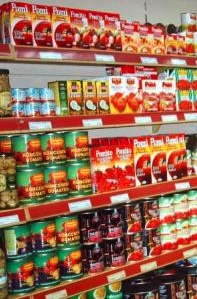Serbia’s Trade With Kosovo in Decline, Leaving Balkan Neighbours To Step In
 Serbian imports to Kosovo have dropped by a quarter and the country is no longer seen as a principal trading partner, Kosovo’s Trade and Industry Minister Mimoza Kusari-Lila told academics and diplomats at the LSE in London. But declining imports from Serbia have not left shelves empty as neighbouring states moved fast to benefit from Serbia’s 25% drop in exports to Kosovo.
Serbian imports to Kosovo have dropped by a quarter and the country is no longer seen as a principal trading partner, Kosovo’s Trade and Industry Minister Mimoza Kusari-Lila told academics and diplomats at the LSE in London. But declining imports from Serbia have not left shelves empty as neighbouring states moved fast to benefit from Serbia’s 25% drop in exports to Kosovo.
“We have increased our trade exchanges with Albania, with Turkey and with Croatia because we were getting space left by Serbian products when we stopped the flow of goods from Serbia into Kosovo,’ said Mrs Kusari-Lila, adding that Macedonia is now Kosovo’s biggest regional trading partner.
“Serbia is not a principal trade partner to Kosovo. But we do need the Serbian territory for our trucks to pass through because it is the easier access to the EU market. Trade with Serbia has declined and, to be honest, I thought it was about time.
“It was about time to have this kind of consequence to the negative policy they had towards Kosovo.”
Serbia Blocks Kosovo Exports
Deputy Prime Minister Kusari-Lila was referring to a bitter customs battle that saw a blockade of Kosovo’s exports to Serbia and restrictions on exports to Bosnia. “After the declaration of independence in 2008, we were facing a severe problem, not only politically but economically as well,’ she said. “Serbia and Bosnia-Herzegovina denied to recognise Kosovo customs stamps, regardless of the fact that they were in full compliance with the 1244 UN Resolution. Even though an economy functions differently from politics.
“Despite the conflicts, Serbia was one of the largest trading partners for Kosovo and they were selling approximately €370 million value of goods a year to Kosovo and, at the same time for three years in a row, blocking any movement of goods from Kosovo to Serbia, or through Serbia to the European Union.
“It was the same with Bosnia, but Bosnia just put a customs tax on it. Despite the fact that they were members of CEFTA (Central European Free Trade Agreement), despite the fact that everything was in full compliance, and despite the fact that the UN themselves told Serbia and Bosnia that we were in full compliance with the CEFTA agreement.”
Kosovo Demands Reciprocity
Enough was enough and Mrs Kusari-Lila took a stance that helped to break the dispute, she said: “Kosovo took a firm stand on this. In my capacity as Minister for Trade and Industry, we had signed a decision in the government that imposed reciprocity. They don’t recognise Kosovo customs stamps, then we don’t recognise Serbia customs stamps. If they impose customs duties on us from Bosnia, we impose customs duties. And, guess what: in less than fifty days, an agreement was reached in Brussels. For the first time in almost four years, Kosovo goods could flow through Serbia and to Serbia.
“This year, for the first time, our statistics show that imports from Serbia to Kosovo have started declining, by at least 25%.
“The lesson learned is that countries should take a stand on principles. Those principles are that, yes, we entered the free trade agreement equal – the same as we plan to enter the EU: on an equal basis. On principles.”
Obama Proclaims ‘Historic Milestone’ for Kosovo
Since declaring its independence from Serbia is 2008, 23 EU countries plus the United States and Turkey, have kept watch over Kosovo. That changed last month, when the International Steering Group announced the end of the international supervision and US President Barack Obama hailed it as an ‘historic milestone’ for Kosovo.
Now the young state is keen to maximise the opportunities of its existing deals, partnerships and treaties, as well as developing new trade links. “For the first time, Kosovo just launched free trade negotiations with Turkey,’ said Mrs Kusari-Lila. “It will be the first time that Kosovo institutions are negotiating an agreement solely by themselves and not with international interference. But at the same time we are building our capacities to start, early next year, free trade negotiations with countries in the EU. When I look back to CEFTA, I have to say that, as much as we benefitted from it, there were also a lot of other political issues associated with CEFTA.
“Kosovo signed CEFTA under UN administration in 2006, at the same time as other countries in the region, including Serbia, Bosnia-Herzegovina and Moldova, three countries that have not recognised Kosovo but who are part of the same free trade agreement. Now, a lot of opposition in Kosovo used to say how can you sign a free trade agreement with a country that does not recognise you? You cannot have contractual relations in this regard when actually you have problems.
“But this government has tackled that problem.’ She said, referring to Kosovo’s reciprocity stance.
.


No comments yet.
Be first to leave your comment!